Ben's 2012 In Film: Reflections & Favorites
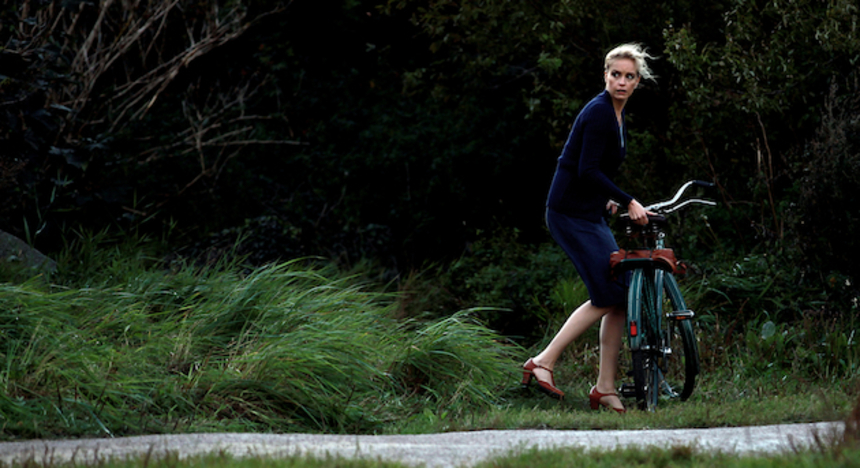
As I look back on 2012 and the films that populated the various landscapes I traversed, these titles are also the guideposts, giving further shape and context, emotion and insight into where I was, what I was doing, who I was with... and yet at the same time they remain so vague and ephemeral. Ah, the magic of the movies.
One thing to note is that this is the first year since 2009 that I am doing a numbered list. Why? The impact of the films I saw this year can, for the existential reasons I exhaled above, be weighed and measured more easily than in past years. So without further ado, my favorite films of 2012:
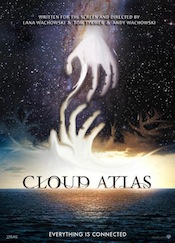 24.) Ruby Sparks
24.) Ruby Sparks Screenwriter/star Zoe Kazan deconstructs the Manic Pixie Dream Girl. Let's just forget that very last scene and focus on how sharply and wonderfully written the rest of the film is.
23.) Cloud Atlas
Ambitious as all get out, Tom Tykwer & Lana & Andy Wachowski's epic played like nothing else in wide release this year. Its merits far outweigh its faults.
22.) Looper
For a moment, let's set aside the fantastic PKD-esque Sci-Fi "loopiness" and touch upon what a fine tale of redemption Rian Johnson's third feature is. Okay, now let's put those two parts together. There. Even better.
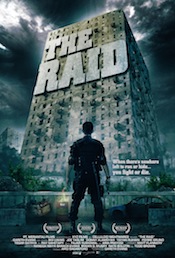
21.) Your Sister's Sister
Lynne Shelton gives Rosemarie DeWitt one of her best roles. Emily Blunt and Mark Duplass ain't half bad either.
A wonderfully verbose love triangle in the vein of Rohmer.
20.) The Raid: Redemption
Yep, it's everything you've heard and more. A lean, mean, fighting machine.
19.) Jeff, Who Lives At Home
Jason Segel gives me butterflies in my stomach -- always and forever. Mark and Jay Duplass know how to do heartwarming just right.
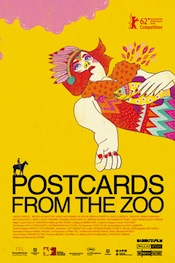 18.) Postcards From The Zoo
18.) Postcards From The ZooWholly original with magic in every frame, Edwin's coming-of-age picture is a cinematic menagerie that delights to no end.
17.) Cosmopolis
Cool as a cucumber, cold as ice. David Cronenberg's pretty econ-tragedy may fumble in its final scenes, but oh, what a dark philosophical ride it is up to that point.
16.) The Innkeepers
The scariest "scary movie" I've seen all year. Ti West is getting better, and less reliant on genre tropes with each new flick.
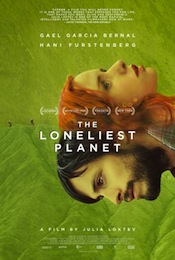 15.) Polisse
15.) PolisseMaiwenn brings us an in-depth look at the Parisian Police Child Protection Unit. Oh, how it ain't pretty. But it is mad compelling. Joeystarr will pull your hear out.
14.) 2 Days In New York
For all of its easy (and perhaps dangerous) stereotyping of both the French and Americans, Julie Delpy's flick is still the flick I laughed at/with more than any other in recent memory. Chris Rock as the straight man is genius.
13.) The Loneliest Planet
A fine slice of minimalism. Inti Briones' cinematography is mesmerizing as is the performance from Hani Furstenberg
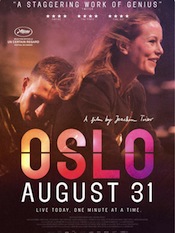 12.) Wuthering Heights
12.) Wuthering Heights Andrea Arnold hasn't missed a step yet. Robbie Ryan lenses like no other DP out there. Their Wuthering Heights is primal, ephemeral stuff. It's poetry on the wind and in the mud; a fever screaming silent in the hearts of youth.
11.) Oslo, August 31st
Joachim Trier and his onscreen counterpart Anders Danielsen Lie are Norway's MVPs yet again. The twenty-something angst of their 2006 Reprise is replaced here with a somber, dark unraveling that is just as uplifting as it is frightening. A portrait of a man, a snapshot of a city, and a tapestry weaved of and for its people, Oslo, August 31st is a deeply affecting love letter to the wandering soul of humanity itself.
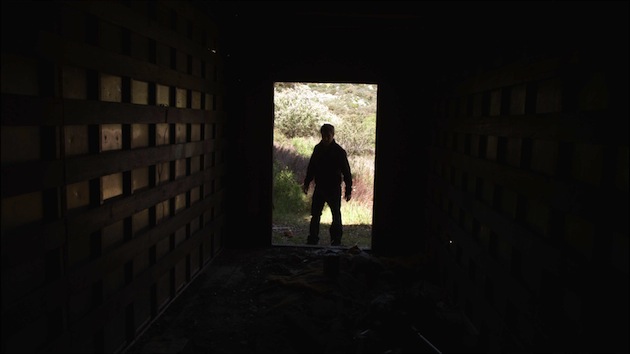 10.) RESOLUTION
10.) RESOLUTION Now this may be because I am still quite green behind the ears, but, boy was it monumentally exciting to witness Justin Benson and Aaron Moorhead's Resolution breakout at last spring's Tribeca. If you're a ScreenAnarchy regular you may find all this rather funny as I know you've seen us pimp the film non-stop since then, but there is really nothing quite like being on the pulse of a film that totally deserves to get out there in the big, wide world... and then does. It can make any old cynic turn into a bright and shining optimist ready to hug the world. Resolution makes me want to hug the world (which is a really weird thing to say if you know the film). Resolution is a picture that is always smart and never condescending to its audience. It is also very funny and perhaps, most importantly, doesn't, and I repeat! doesn't, betray its characters for big ideas, though it is a film that has plenty. You can call it a deconstructionist horror film if you like. Heck, you can toss a bunch of pop culture comparisons and influences like Lost, The Twilight Zone, HP Lovecraft, Tobe Hooper, and yes, even Monte Hellman into a blender and say that'll just about do it for a mixed-media margarita. But really, anyway you shake it, anyway you slice it, dissect it and look (and look) again (and again), Resolution is its own thing. Or really, it is its actors Peter Cilella and Vinny Curan's thing. It is Benson & Moorehead's thing. It is a kick-ass, low budget DIY thing that makes me say, "Yes, let's get out there and make some freaky (freaking) movies!"
Resolution drops on VOD January 23rd in the US, and has an exclusive theatrical engagement in LA starting on the 25th.
 9 & 8.) SUNDOWNING and THE SOUND OF SMALL THINGS
9 & 8.) SUNDOWNING and THE SOUND OF SMALL THINGSLike Resolution, these next two films are highly inventive low-budgeters. I mention them together as they both came to my doorstep via last year's Slamdance. So in that case, despite being very different films, I can't think of one without the other. Frank Rinaldi's Sundowning is a deeply (and at times rigorously) challenging science fiction piece on memory, identity and perception, while Peter McLarnan's The Sound Of Small Things is a lo-fi drama that gradually utilizes experimental techniques to emphasize a couple's disintegrating relationship. It was also the first film I watched after suffering from a bizarre illness that put a hold on movie-watching for a few weeks (to find out more about that read my full review here). Unlike Resolution, it is doubtful that you'll be able to see Rinaldi and McLarnan's films anytime soon as neither have yet to fine a home beyond the festival circuit. My hope is that by mentioning them here, these will be directors you remember for down the line, when they have new films making the festival rounds -- which they both undoubtedly will.
Here are some further thoughts on Sundowning from my review:
Never betraying its roots as a somber and minimalist character study, Sundowning is a wildly adventurous picture, unafraid of contrasting itself, essentially uprooting the medium that it exists in for the sake of exploring the vast psychological depths of perception.
And a couple of snippets from my review of The Sound Of Small Things:
Sam Hoolihan's turn feels like that of a sad clown -- one we would find in an Italian opera, though here he is without his voice (or is it that he now carries a pair of drumsticks instead?). Appearing like a castaway from a Carl Theodore Dryer silent, Cara Krippner moves through each frame with a splintered defiance and curiosity; yearning to experience... and yet... she isolates herself, removes herself so easily. McLarnan's first feature is some kind of mini-marvel. It is a film that filters very nuanced, naturalistic dialog and settings through increasingly experimental means and ways.
For fans of truly independent and exciting cinema, remember the names Frank Rinaldi and Peter McLarnan. Trust me. You'll thank me later. [Update: It's been brought to my attention that SMALL THINGS... is now available to stream through the fair trade film site Seed & Spark. I have not used this service, but if you are interested, here is the link.]
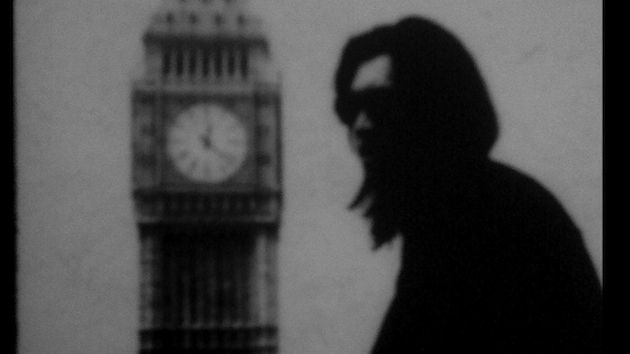 7.) SEARCHING FOR SUGAR MAN
7.) SEARCHING FOR SUGAR MAN A great music documentary, an incredible true life mystery unraveled before our eyes, and an absolute testament to the good just one man can inspire -- really just a wonderful story in any medium. If you have yet to see Searching For Sugar Man, or are unfamiliar with the story of folk musician Rodriguez from elsewhere, I implore you to not read anything further on the film, the myth or the man behind it. Don't read any reviews, and heaven forbid you watch the trailer. Just take note of the title and if you live in the states, rent the DVD/Blu when it is released on January 22nd. That's it. All I have left to say is: Malik Bendjelloul, you and your crew, the people of South Africa and Detroit, and most of all Rodriguez himself, have shared with the world a story I will carry in deep gratitude and joy for the rest of my life.
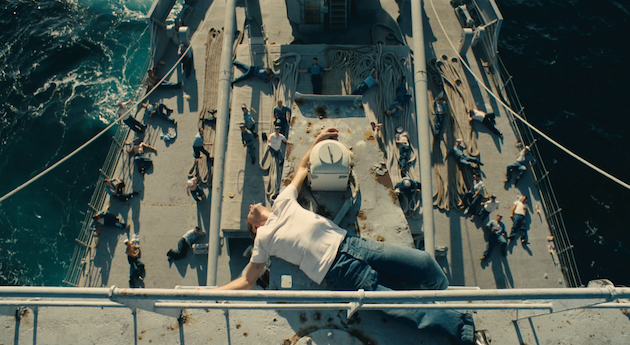 6.) THE MASTER
6.) THE MASTER Joaquin's Phoenix plays Freddie, a scoundrel and a drunkard; a seaman adrift in Post-war America, who finds himself welcomed into the inner circle of the charismatic, commanding, and contradictorily ungrounded mess of genius that is Philip Seymour Hoffman's Master, an L. Ron Hubbard type polymath. It was quite the event last fall to see these performances play out in 70mm, with a rapt audience. The Master is a sweeping, grandiose love affair between the id and the super ego: ferocious and splendid, wily, and silly, nightmarish, subtle and colorful. One performance doesn't work without the other. The film is as dreamy and wayward with time and the senses as it is formal and precise. Paul Thomas Anderson strays further and further from the traditional narrative path and it is mesmerizing to watch.
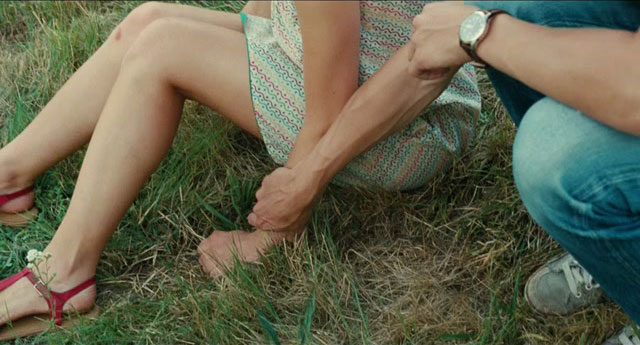 5.) GOODBYE FIRST LOVE
5.) GOODBYE FIRST LOVEMia Hansen-Løve is one of the most nuanced, gentle and understated directors working today, and what she achieves with her third feature is nothing short of miraculous. With a fine co-creator in the beguiling Lola Creton, she beautifully captures that moment when one moves from adolescence into young adulthood, in all its joy and heartache. Her trust and belief in the then 16-year old Creton to play Camille across an 8-year period (15-22) allows for this magic to arise almost effortlessly. This rare occurrence is what makes the film so quietly profound.
Contemplative Cinema at its very best, Goodbye First Love is currently available Stateside on Netflix Watch Instantly.
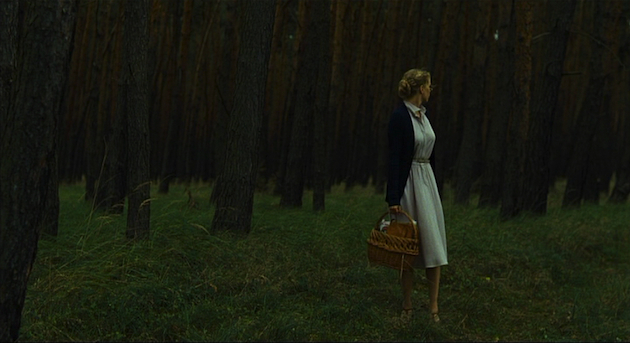 4.) BARBARA
4.) BARBARA 2012 was the year I discovered German director Christian Petzold and the so-called Berlin School of filmmaking. Often meditative works on post-wall Germany with echoes of genre, these are politically and socially minded films absent of rhetoric. Petzold's filmography, from the economic nightmares of Yella to the wayward youth of Ghosts, largely explores the structures and systems people choose to exist in, or try and escape from. Petozld's cinema is a cinema of haunted people in haunted places. Barbara exemplifies this tenfold.
In her fifth collaboration with Petzold, Nina Hoss stars as a doctor in East Germany circa 1980, who, after several repeated escape attempts to the West, is banished to a rural pediatric hospital. Her continued plans of escape come into doubt when she befriends the hospital's handsome head surgeon, André (Ronald Zehrfeld) and Stella (Jansa Fritzi Baur), a troubled patient from a hard labor camp. All the while she must endure the watchful eye of the local Stasi officer and his frequent home visits. In a career full of beguiling performances, Hoss' turn as Barbara is nothing short of astounding. Quiet and steadfast in her resolve, in many ways Barbara recalls a classic movie heroine. Hoss further extends to Barbara a humane beauty that is ever so nuanced and mesmerizing to watch. If Barbara offers us anything it reminds us that that the German Democratic Republic was a real place with real people; a complicated place, not just made up of the black & white stereotypes we've come to know through much of recent cinema.
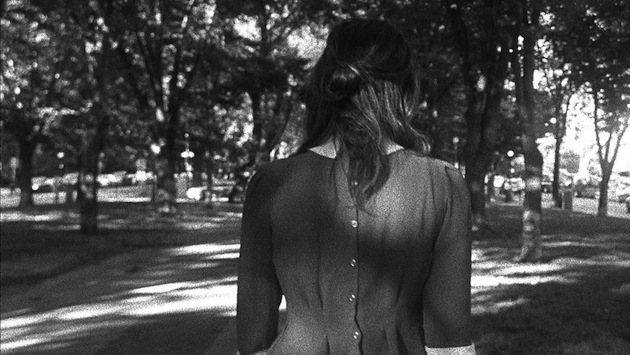 3.) THE COLOR WHEEL
3.) THE COLOR WHEEL The Color Wheel is a horrible film. I mean that in the nicest way possible.
Truth be told, upon first viewing, my reaction was lukewarm. Many critics have stated how difficult the film can be -- and it may just be the most transgressive film of the year -- but I wasn't wholly deterred by that aspect. In fact, that's probably what I really appreciated about it at the time. So the film stayed with me. For days, and then weeks on end... and here we are now.
Played with sarcastic abandon by director Alex Ross Perry and co-writer Carlen Altman the road-tripping sibling duo of The Color Wheel are anything but friendly people. They are nauseatingly narcissistic and narrow-minded. The shenanigans (and I am quite confident that is an apt description here) begin when JR asks her brother Colin to help her move out of her ex-professor/ex-lover's house. She dreams of becoming a broadcast journalist, which is such an absurd notion for this slacker, that it may be one of the funniest running jokes in the film.
Perry has said that the only real influence for him on The Color Wheel was Jerry Lewis, a man who fashioned his whole career from blatant stereotypes for the sake of shining a hard light on the ills of prejudice and alienation in our culture. While Perry and Altman have clearly written swatches of themselves into their roles, what I find so amusing and even identifiable about Colin and JR is that they are essentially artifices, masks. The people and places they interact with during their journey across the northeastern U.S. feel so bizarre to us because the siblings can't relate to much of anything out of their own orbit. In this world labels such as 'asshole' 'loser' and 'racist' are dangerous things, and yet they are all anyone has to communicate with. The Color Wheel is an insular affair, ending in a radical mirroring and then stripping away of identities, which only reveals a much larger, and perhaps even more frightening crisis underneath: the reveal of one's truest self and the question "Am I okay with who I really am?"
The Color Wheel is available to rent or buy in the U.S. on iTunes, and rent on VOD services.
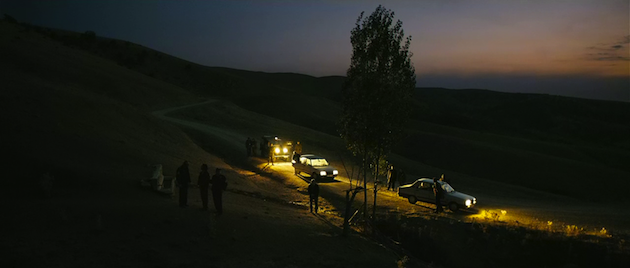 2.) ONCE UPON A TIME IN ANATOLIA
2.) ONCE UPON A TIME IN ANATOLIA Perhaps the most engrossing and hypnotic police procedural since Zodiac, and by far the most extensive and introspective study on the nature of truth since god knows when, Once Upon A Time In Anatolia's parallels to Fincher's masterpiece pretty much end there. Bay Area 'burbs, parkland and city streets are replaced by the cold, late autumn expanse of the Anatolian steppe, a tabula rasa in nature if there ever was one. The bright-eyed puzzle hunters, hard newspaper men and menacing suspects of Fincher's film are shuffled aside to make way for the quiet gaze of a big-city doctor, the bitter humor of a country prosecutor and the boiling anger of a police chief who's done before he's even started. Along with half a dozen others, they set out across the steppe to search for a buried body. The night they spend together is long and full of doubt.
An out and out masterpiece in its own right, this is a major turning point for Nuri Bilge Ceylan, arguably Turkey's greatest living director already. Very much like the nature of the film itself, its masterpiece status is hard to define beyond the basic feeling that you just know this is great. An obvious disciple of Tarkaovsky, Ceylan's filmmaking prowess stretches 'round a slightly different bend than the man who coined the term 'sculpting in time'. While Tarkovsky's main focus was on how memory and the past seep into the present, Ceylan's eye is fixed on the present moment and how memories are formed nearly instantly, shaping and reshaping the unfolding moment.
Once Upon A Time In Anatolia is available to watch in the U.S. on Netflix Watch Instantly.
 1.) HOLY MOTORS
1.) HOLY MOTORSHoly Motors is the bridge between the analog age and the digital age. It is a swan song for the old picture show, and the triumphant arrival of this haunted, haunting medium born anew. It is an extremely personal tale from Leos Carax, an autobiography interpreted through dream and nightmare, a self-propelled (seemingly self-indulgent) cinephilia for the entire universe to share in.
A great movie cues me into the world around me, it reminds me of the richness of reality, because to me, cinema is not an escape, it is just as much a part of reality in its many surreal sorrows and absurd delights as anything more "grounded". Holy Motors is this. We're are all this, the holiest of motors. With or without cameras. We are spurred on to perform, to play a part, to put on a face. These roles we play out whether it is for art, for the pleasure and duty of acting on stage or screen, or in the other life, the real life... who is to say where the line is drawn; where the storytelling and the spectacle is unmasked as a sham; a simple hat trick.
In Holy Motors Denis Levant's Mousier Oscar goes from appointment to appointment, creating characters and lives in the span of a commercial break, shedding them just as fast. What are his obligations if not to living itself, or to the memories of living, or offering a service to others, so that they may live. Carax and his on-screen alter ego know this. Because at its core, despite its exuberant unwillingness to be pinned down as any one thing, Holy Motors is indeed a simple film. It is crystal clear in its emotions, in its craft, and in the thousand and one questions it prompts in you.

Do you feel this content is inappropriate or infringes upon your rights? Click here to report it, or see our DMCA policy.






